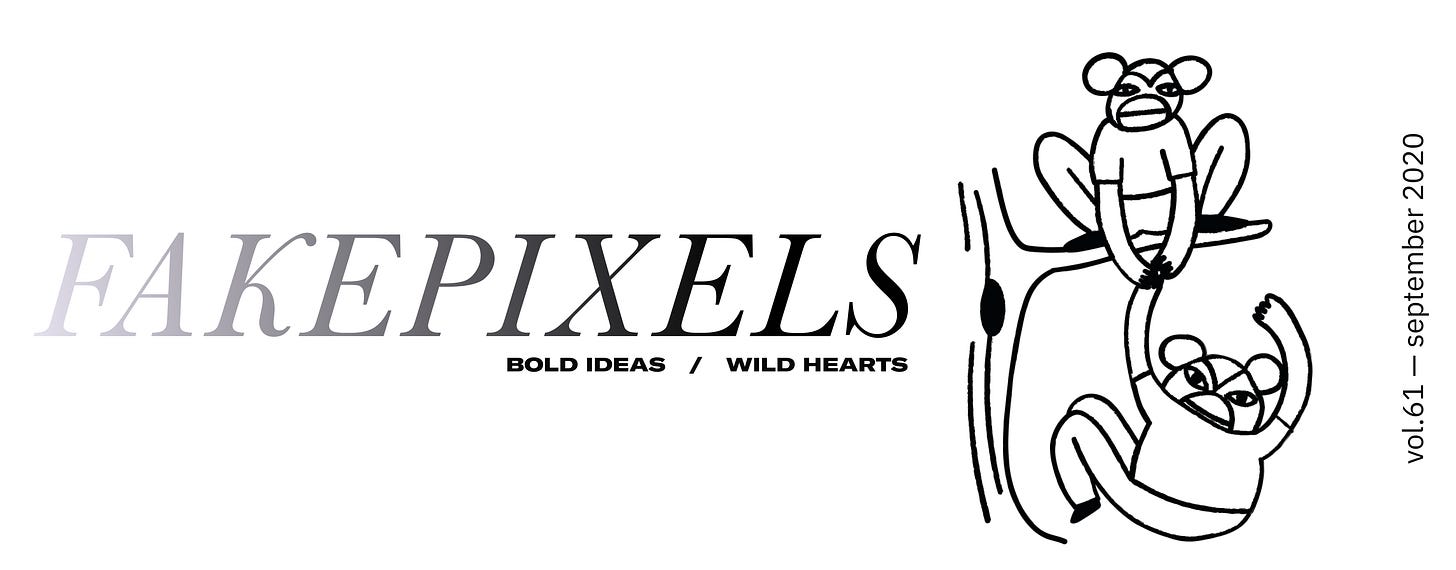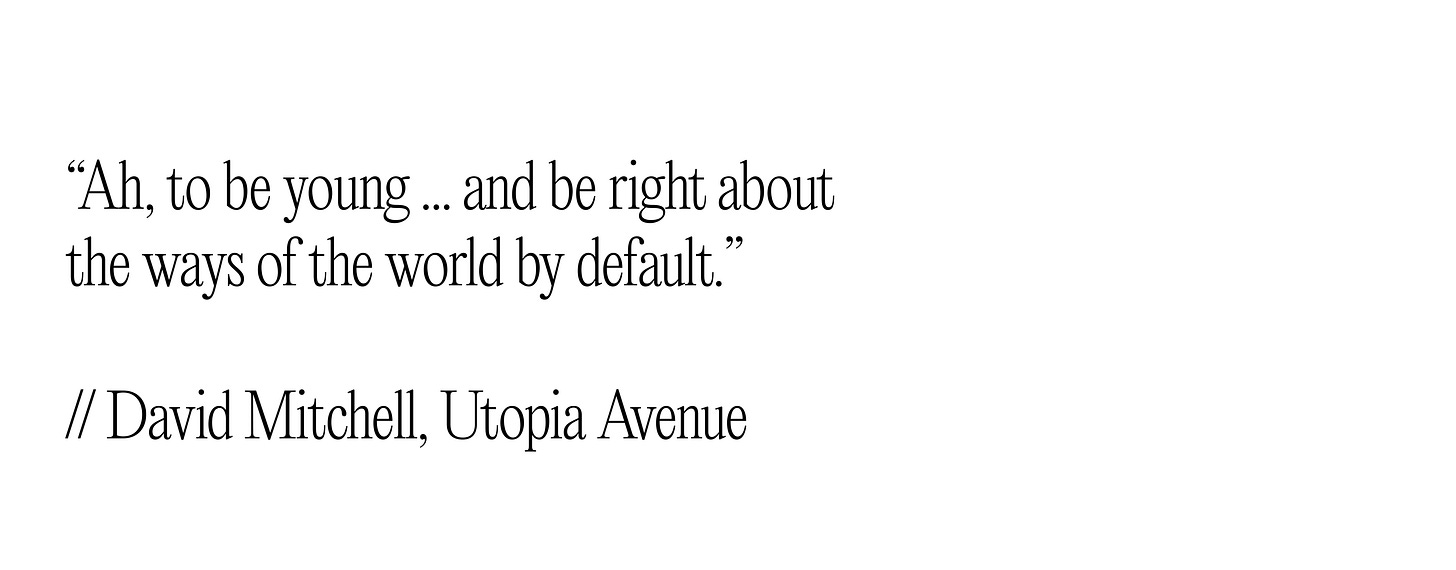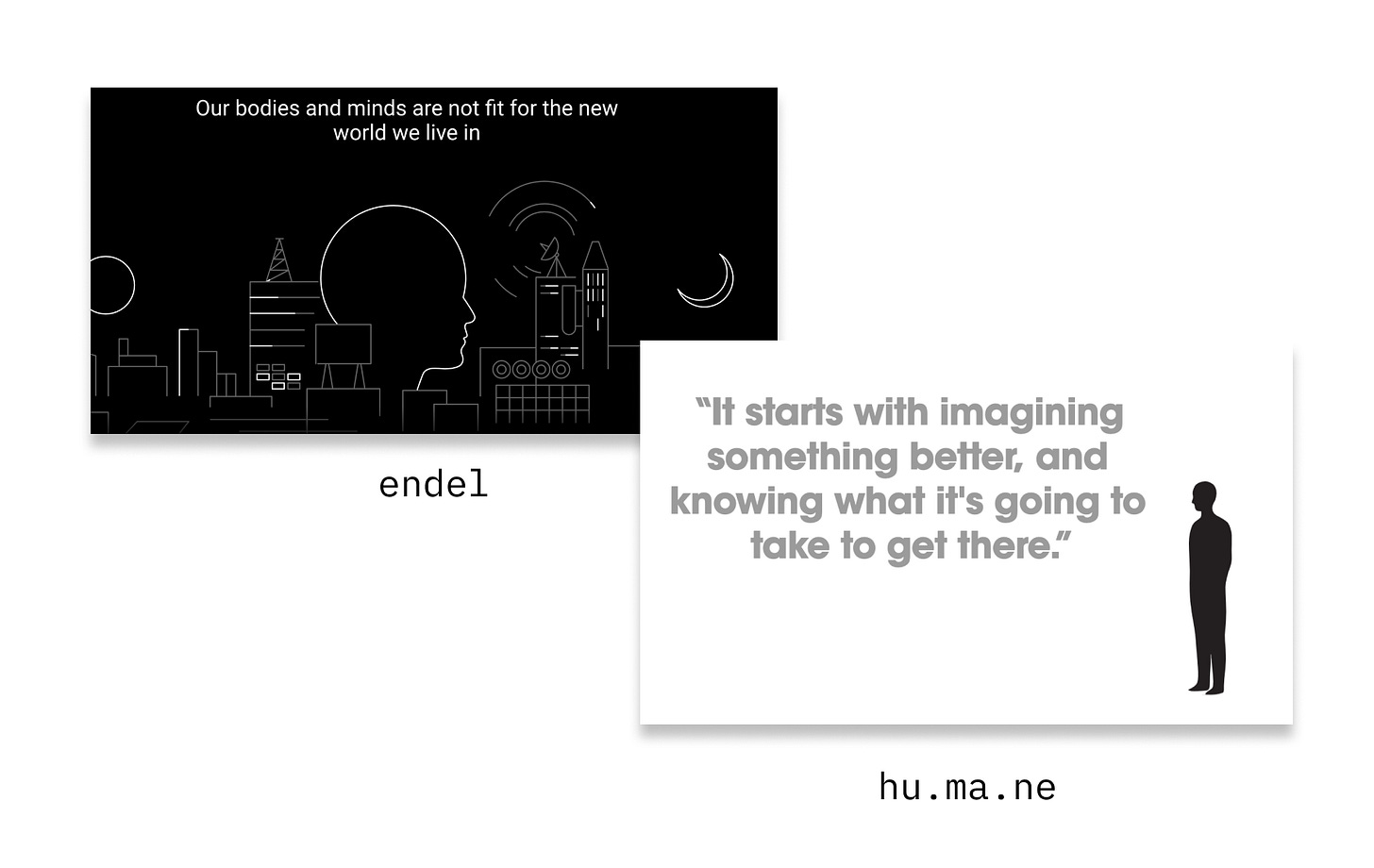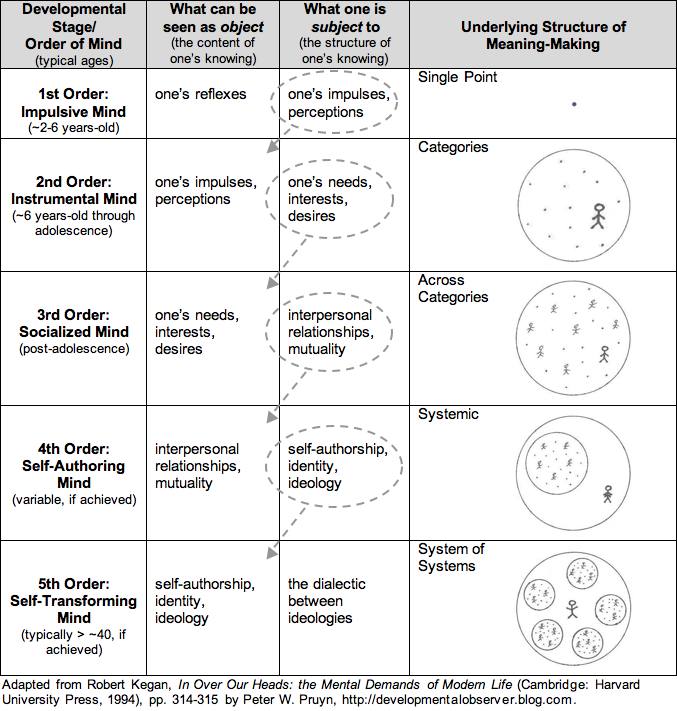[FKPXLS] VOL.61 / Not young enough to know everything
People talk about "turning points" in life. It never felt like so at the moment.


Happy brunch time. I am sitting by my apartment window in New York City, listening to Tokyo Slow Mixtape 18 by TokyoBike that is playing sometime in your past, which is also my present.
What we share is Fakepixels, a space for honest inquiry and bold ideas. Here, we are not afraid to ask bold questions and find invisible forces that challenge the status quo.

"Education is the path from cocky ignorance to miserable uncertainty," Mark Twain might have said this. Uncertainty is also romance; in the words of Oscar Wilde: "I am not young enough to know everything."
Jordan and I found the time to sit outside on the patio and reflect on my past month. It felt like a short month, but it also felt like forever. People talk about "turning points" in life—how they might have altered someone's life trajectory by making some minor adjustments to the slope or the direction—it never felt like so at the moment. What was present was just the tender breeze of early fall and an infinite set of possibilities. One of these small incidents, one of these dialogues, would render a whole dream that was once unimaginable.
He gave me a piece of feedback. For the past month, he hasn't yet seen me obsessed with an idea.
"Everything you share is interesting, but what are you obsessed with?"
To level up to the next stage of practicing the craft, I need to develop conviction. After seeing a dozen times what "greats" look like and what it takes to get there, the development of "obsession" became difficult, as it takes a deeper level of insights that can no longer be easily discovered. I'd be nowhere close to getting the full picture by the time a decision has to be made, but I know that's a leap of faith I eventually have to make.
It's when I passed through a block where handcrafted gold chains are being sold and jazz performances being shared and a young man in a suit jaywalking with a Thinkpad that I recognized what I'm deeply obsessed with is, well, the act of obsession itself: how each of these individuals, dreaming their own dreams and facing different battles, can vibrantly coexist with one other and with a global pandemic. They may have different destinations, but they all decided that NYC is the best place to be, at least for now.
NYC is an example of a robust meta-layer that supports many worlds to converge with some shared obsessions and coexist safely and independently. There's an infrastructure, both visible and invisible to me, that motivates, supports, and rewards its members' obsession. The essayist Benedetto Dei wrote about the beautiful Florence in 1472, the city that made Leonardo Da Vinci possible:
Beautiful Florence has all seven of the fundamental things a city requires for perfection. First of all, it enjoys complete liberty; second, it has a large, rich, and elegantly dressed population; third, it has a river with clear, pure water, and mills within its walls; fourth, it rules over castles, towns, lands, and people; fifth, it has a university, and both Greek and accounting are taught; sixth, it has masters in every art; seventh, it has banks and business agents all over the world.
Dei's description of Florence rhymes with what New York feels like at its best. Similar themes can be observed by studying the Internet communities closely. Liberty of speech is encouraged but could cause potential unrest. A global and diverse population is included and also muted. Some of them well-dressed. Rivers of data that are not perfectly clean or pure. Online schools teach everything, from quantum mechanics to how to pose for a selfie. The wonder of the Internet is by being a metalayer for these diverse sets of pursuits. A floodgate of unnamed desire, that's once suppressed by mainstream discourse defined for centuries by some authorities that only resemble truth, has now been unleashed. Yet not all of these desires are being treated equally, nor were they being protrayed fairly.
The deluge of APIs, packages, frameworks, templates, digitally-native marketplace supercharged the construction of the metalayer. Yet the discussion is still nascent around building the Internet as a human system, like the type of discussions an urban designer would have when building a new bridge, a library, or a new playground for the public. The local optimization of workflows can lead to better productivity, yet obsession with the means may also be procrastination to deal with the end. It's like building the ducts and drywalls for a building with no intention of hosting people or designing a perfectly built marvel in isolation with no intention of being discovered. The means can be elegant, but the end is always messy because the end is human. The end is having to ask each other difficult questions, confronting the deepest obsessions and insecurities with deep empathy.
It's much easier to understand a digitally-native SaaS business when both the means and the end exist in the digital world, and the interactions are more machine than human. Some of the hardest problems awaiting to be solved are precisely those that involve the irrationality of reality. To turn this messiness into an opportunity to provide a moment of meaning and delight is precisely the type of enterprise that we would want to support. It requires some additional effort when articulating the thesis to others. It's tempting to outsource this effort to some coined phrases: consumerized SaaS, product-led growth, and so on. To say that I never use those terms would be a lie, but I'm training myself not to. It's sloppy. When conducting research or diligence to understand a space, it's tempting to read some industry reports, podcasts, medium articles, ask friends who have consulted a project in the space, and call it a day. Yet I've been only discovering true insights when talking to people living and breathing in a space that has long been abstracted away in my own world.
Therefore, to develop the conviction needed that stems from unobvious insights, the craft becomes more akin to an investigative journalist's. At the 1999 Berkshire Hathaway Annual Meeting, Buffet said to the investors:
Essentially, you're being a reporter. I mean, it's very much like journalism.
You talk to the competitor, and you say, "If you had a silver bullet and you could only put it through the head of one of your competitors, which one would it be and why?" Well, you learn a lot if you ask questions like that over time.
And you ask somebody in the XYZ industry, and you say, "If you were going to go away for ten years and you had to put all of your money into one of your competitors — the stock of one of your competitors, not your own — which one would it be and why?" Just keep asking, and asking, and asking.
And you'll have to discount the answers you get in certain ways, but you will be getting things poured into your head that then you can use to reformulate and do your own thinking about why you evaluate this business at this or that.
[...]
You keep asking those questions. And then you go to the guy they want to put the silver bullet through and find out who he wants to put the silver bullet through. It's like who wakes up the bugler, you know, in the Irving Berlin song? And that's the way you approach it. And you'll be learning all the time.
You can talk to current employees, ex-employees, vendors, suppliers, distributors, retailers, customers, all kinds of people, and you'll learn.
But it's an investigative process. It's a journalistic process. And in the end, you want to write the story. I mean, you're doing a journalistic enterprise. And six months later, you want to say the XYZ Company is worth this amount because and you just start in and write the story. And some companies are easy to write stories about, and other companies are much tougher to write stories about. We try to look for the ones that are easy.
The journalistic process applies to investing but equally so to company building. Journalists look for answers about how and why things are as they are to report about them, while company builders do so to create valuable products and solutions. It's becoming rarer that the "moving fast" culture encourages this level of intellectual rigor. When contemplating homelessness in an affluent society, journalist Mary Kay Blakely wrote in the LA Times that the homeless " was not dropped on our streets by a deus ex machina. They arrived through human actions and social choices," which included government urban renewal that destroyed low-income housing but failed to replace it with something desirable and affordable; elimination of unskilled jobs that supported families; and deinstitutionalization of the mentally ill along with the simultaneous reduction in funding for community-based mental health programs.
This level of investigation may be unfriendly to the timeline of venture investing. But maybe that's the benefit of being young. There are quick opportunities to be seized. What's more meaningful is possibly the longer road to be taken, and the many subworlds that need more understanding.

Flow state revolution. Visualized.

The entire tech industry recently has been working on pushing tech to the background, so we can focus on being human. The AI mindfulness company Endel’s manifesto and the latest hu.ma.ne release feel like a quiet revolution against previous exploitation.

People are claiming that the AI behind Endel works like wonder, while others say that this entire app is simply an album.

A review from App Store

Regardless of whether the 6.3x improvement is false precision or based-on-research, the steps from data capture, to data interpretation and visualization, to actual insights have been.
Jordan invested in Soylent 7 years ago after witnessing the vibrant biohacking community that tries to unbundle nutrition into building blocks, so that they can be reassembled to optimize for desired results. Yet it’s not until the new wave of health wearables become more mainstream than the local optimization of parts of our health can now be holistically interpreted as actionable insights.
The same goes for sleep and mindfulness tech. My Headspace session is only as effective as I believe it to be. There’s no actual data to validate the efficacy of its impact on my physicality. Companies are finally closing this loop start providing actionable insights, enabled by data collected through both hardware and software. Endel is one example of that, although I don’t know yet what hu.ma.ne is brewing, the hardware/software combination is implying something similar.
Not sure if I’m ready yet to meet my hero.

BookClub is taking a MasterClass approach to education and the media. MasterClass sells celebrity-taught classes with a big focus on premium production. For $15/month subscription fee, you can now have access to 85+ classes across 9 categories. One of these categories is writing, which is now led by the all-star lineup including Malcolm Gladwell, Neil Gaiman, Magaret Atwood, David Sedaris, and many more.
I probably have taken four of them, and Masterclass continues to be one of my favorite consumer companies in the past few years. A new company just emerged out of incubation with a $6M seed funding that aims to not only teach you how to write, but turn celebrity writers into cult leaders of book clubs.
The founder David Blake, who previously co-founded ed-tech startup Degreed, said in an interview:
“MasterClass has authors already on their platform, but they are all 100% teaching the skill of how to be a good writer. Our platform is being built from the ground up, exclusively for this use case — and will be feature rich with things that can help tag, explore, discuss by characters, themes, questions.”

This, supposedly, will be great for the writers, who notoriously write books about book tours.
In an essay titled “The Spirit World,” Sedaris recounts his last interaction with his sister Tiffany before she committed suicide. The two had a difficult relationship and had not spoken for four years when she appeared unannounced at one of his readings in Boston. Sedaris ignored her, turned to a nearby security guard and asked him to shut the door. That was the last time he saw her.
“I feel the audience giving me the appropriate reaction when I talk about shutting the door in her face,” says Sedaris of reading that essay aloud on his book tour:
They didn’t expect that, and then they have to recalibrate their feeling toward me. When I read that the first time, I thought, Do I really want to admit this? But it seemed false not to. If you try to make yourself look better than you are, that’s bad. Especially if you’re making other people look bad, you have to be up-front about how bad you are.
Sedaris’ performances are integral to his writing process. He reads essays aloud on tour, marks down the audience’s reactions to certain sentences, returns to his hotel room to revise the story, and then adjusts the delivery the next night. He read each of the essays in his essay collection Calypso onstage at least 50 times before the book was published. He also taps his audiences for stories and inspirations, chatting with every reader who stands in the book-signing line.

David Sedaris in his Raleigh, North Carolina, apartment, in 1980.
Yet, he seems to be unapologetically resistant to ever digitizing this experience. In a recent interview with the New York Times, he confesses:
My goal is to get through this without ever going on Zoom or FaceTime or Skype…People are like, Can you record a message of hope for all the people who were going to come to your show?’ and I’m like, ‘No, because it’s not like there aren’t things to watch already.
Sedaris is one of a kind. Will other writers find solace in connecting with their readers digitally? Possibly. And I will, for sure, pay for the chance to meet my heroes, as much as I was warned not to. What’s more exciting to me is the possibility to meet others who share the same heroes.
When the Fake™ is better than the Real®.

Source: Gretel.ai
Reality is imperfect, the way we capture it even more so. The algorithmic bias that we see all over the news is a common result of imbalanced datasets. Handling these imbalanced data in machine learning is a difficult challenge, and can have a meaningful impact on the efficacy of detecting payment fraud, diagnosing cancer or disease, and even cybersecurity attacks.
One way we can improve the model’s performance is by using synthetic data through a popular technique called SMOTE (Synthetic Minority Oversampling Technique).
Described by Nitesh Chawla et al. in their 2002 paper, SMOTE works by selecting examples from the minority class, finding their nearest neighbors in the minority class, and effectively interpolating new points between them. SMOTE does not have the ability to incorporate data from records outside of the minority class, and that is when synthetic data come into play.
Gretel’s latest product release makes this process extremely painless, and even beautiful and fun. Even a noob like me can quickly play around with some Kaggle datasets using Google Colaboratory. You can also run it on Jupyter notebook. It’s also free.

One example that the Gretel team uses in their case studies is UCI’s Heart Disease dataset, where male patient records account for 68% of the overall dataset, with female patient records at only 32%. Algorithms trained on the dataset over-indexing on male symptoms and performing poor diagnoses for female patients.


If we take a look at the results, the original model accuracy average for Females was 84.57%. By augmenting female patient data records and training the same models, accuracy improved to 90.74%. Interestingly, male patient data prediction accuracy improved as well from 86.61% to 90.71%!

The rapid turnover and intense competition make innovation a necessity for the restaurant industry. They either adapt or die.


Source | Noema
A study of Noma, one of the most welcoming and innovative restaurants based in Copenhagen, by two hungry professors reveals that the main method of innovation here is not de novo invention, but recombination: bringing old things together in new combinations. The point has been made by Joseph Schumpeter as early as in the 1930s: “Innovation combines components in a new way.”

Source | Savvy& Fine
The Fat Duck, an award-winning restaurant in Britain, developed a seafood dish called Sound of the Sea, with the sound of waves coming from an iPod Nano hidden inside a seashell, after collaborating with psychologists at Oxford University. What they’re innovating here isn’t how food is being made, but how it’s being consumed. Just like most of the consumerized enterprise apps, what’s being innovated isn’t machine performance, but the way that data is being presented and transmitted in a system so they are friendly to humans.
Those who have studied how chefs innovate report that they follow a process of feed-forward trial and iterations, experimenting with variations on a central idea till they hit on a dish that they think will win the approval of customers. It is not very different from the way Thomas Edison improved the light bulb or the way that consumer apps are being made these days.
I learned about this from Matt Ridley’s latest book “How Innovation Works”. While I tend not to consume that many books on business, I find this one a highly entertaining and satisfying read. A dose of optimism that we all need in a time like this.
I might also just be hungry right now.


I found myself revisit Kegan’s adult development framework illustrated above over and over, as it largely inspired my understanding of ethics, society, myself, and my relation to others.
David Chapman, writer at a niche-famous philosophy blog Meaningness, provides his own spin on Kagen’s framework and makes a radical claim: we’ll soon face civilization collapse — if we don’t address the missing link that hinders adult development.
Chapman summarized Kegan’s work:
My summary of Kegan’s theory included a point that merited only a footnote there, but which I want to emphasize here:
Stages 3 and 5 both tolerate contradictions, but of different types and in different ways.
Stage 3 does not feel a need for rational justifications, and mostly doesn’t have the capacity to use them; so it mostly doesn’t even notice logical contradictions, and isn’t bothered by them when it does. However, stage 3 can be highly intolerant of contradictory value judgments, because they threaten community harmony.
Stage 4 finds contradictions within its system a fundamental problem, and tries to eliminate them one way or another. Eventually, if contradictions cannot be eliminated from the system, it must be replaced. Stage 4 wants to find the right system, and if two contradict, that shows one is wrong.
Stage 5 recognizes the value of sorting out contradictions within a system, and retains stage 4’s ability to do so. However, it doesn’t expect any system to work perfectly, so it tolerates internal contradictions if they appear relatively unproblematic. Stage 5 entertains multiple systems, and is comfortable with contradictions between them, because systems are not absolute truths, only ways-of-seeing that are useful in different circumstances. Stage 5 is uniquely comfortable with value conflicts, since (unlike both 3 and 4) it does not take any value as ultimate.

Source | Meaningness
A well-rounded education can provide the mental models and frameworks around particular frameworks to understand the world works now, thus graduating from stage 3 to stage 4. Well-established insitutions post-education impose existing rules optimize for efficiency, and thereby reinforces a particular identity or ideology.
How do we break through the rationality that defines stage 4 and critically examine the system’s own rationality? Chapman suggests that culture and community are essential, and stage transitions usually can’t be accomplished solo:
They should challenge current-stage behavior to push you toward the next;
They should support you during the transition, to minimize negative consequences when you are halfway through and can’t quite make the next stage work;
They should confirm (praise and reward) next-stage behavior to the extent you can do it.
The irreverent and supportive nature of early internet communities, the tech and startup scene in NYC for the last decade embody these values, the Web 3.0 decentralized community groups around the world mobilized via Telegram also embody these values. And why does it matter?
These communities only represent a minuscule percentage of the overall population, and people within these communities are no longer aware of that. The “problem-solving” obsession stems from a well-intention, but the problem is not simply the lack of access to “x” (some object of desire), but how knowledge and information are being transmitted and distributed. In order to truly solve problems, we first need to grow up and confront our problems clearly and recognize that we are as much as the problem as the problems we are trying to solve.


Me, Myself and My Multiple AvatarsYou close out of Facebook, then Telegram, then the others. You think through the 20-odd pseudonyms and personas you have constructed for yourself across the internet, running a mental audit.
A portal to 2030, when we not only contain multitudes, but we get lost in them.
The Page As ExistenceKafka was indebted, not just to writing, but to writing that felt true. For Kafka, as for most writers, good writing is born of truth. When his work felt false, he discarded it. He was aware of the dizzying freedom of the page, but rather than search for a guide or set of rules to write by, and thus curtail his responsibility for his writing, Kafka continued trying to write what only he could write. He would not accept anything that did not feel authentic.
A heart-wrenching portrayal of what it means to write honestly and authentically. This captures the reality of writing, with very little sugarcoating.
Access DeniedIn 2018, the Federal Trade Commission fined RealPage $3 million for using wild-card searches; the company did not have to admit wrongdoing. The company brings in about $48 million annually from tenant background screenings, according to court filings.
A thrilling report on how mistakes on background screening evict and deny access to tenants who need housing the most. Errors on background check reports have an outsize effect on people with common names — particularly members of minority groups, which tend to have fewer unique last names.
The Inertia of Our Education SystemThe most obvious benefit is hard skills for students, earned quickly, and cheaply. Other dimensions like emotional intelligence and knowledge in the humanities are not obvious.
My dear friend Mind writes a wonderful newsletter that covers the latest innovation on EdTech. A reflection needed as a dozen new companies in the space emerge.

Anyone who has walked through NYC’s Union Square and managed to look up has seen this public art project: a large, multi-numeral digital clock embedded on the side of a skyscraper that counts the hours, minutes, and seconds to and from midnight.
As of Saturday, it began telling a different sort of time. It now marks the years, days, hours, minutes, and seconds that the world has to limit carbon emissions before we reach a tipping point.

Fakepixels is a space for courageous thoughts.
We believe in the power of deep thinking, nuanced dialogue, and creative courage. By being present with the world and with each other, by learning relentlessly, and by bridging knowledge across realities.
We’re here to dream and agitate and question openly and unapologetically. We’re here to be vulnerable, honest, and true. If you are interested in contributing, I would love to have you join the club, and why don’t you bring a friend?



